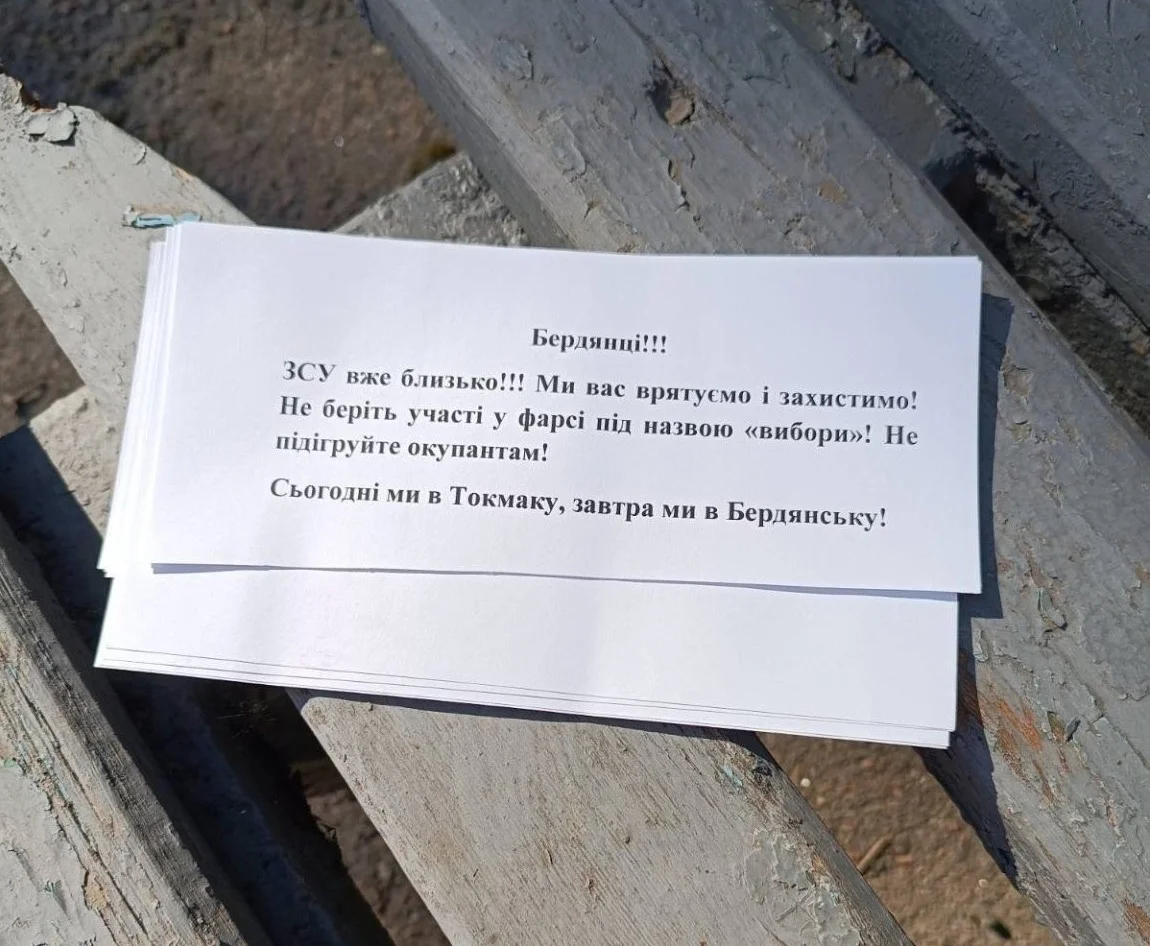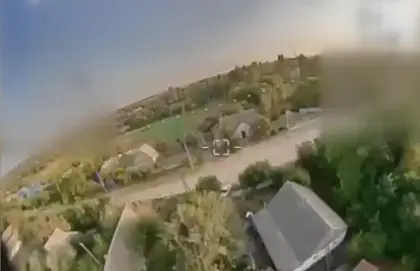Russia’s attempts to hold sham elections in occupied areas of Ukraine have been impeded by protests, kamikaze drones, and the “liquidation” of collaborators, Kyiv Post has been told.
Russian occupying authorities between Sept. 7 and Sept. 10 are holding pseudo-elections across the temporarily occupied territories of Ukraine. Ballots are being held in parts of the Donetsk, Luhansk, Zaporizhzhia and Kherson regions, as well as in temporarily occupied Crimea.
- Look at the most up-to-date Ukraine news that came out today.
- Check out the freshest Ukraine news items as of today.
JOIN US ON TELEGRAM
Follow our coverage of the war on the @Kyivpost_official.
According to British intelligence, the Russian ruling party, United Russia, is set to receive a clear majority, with Kremlin polls projecting at least an 80 percent of the vote. Despite more than 1,000 candidates, there are not enough qualified, experienced and independent representatives who are not members of pro-Kremlin parties.
One of the more dramatic attempts to disrupt the vote was an operation by Ukraine’s Security Service of Ukraine (SBU), which saw two drones – in the words of the SBU – “vote” at a polling station in Zaporizhzhia by blowing it up.
“Elections here ended prematurely,” an SBU source told Kyiv Post. “After the explosions, the occupiers got nervous — they surrounded the nearby streets, started checking people, and launched their drones in the air.
“This is another warning to the occupiers and collaborators that Ukrainian land will literally burn under their feet.”

Trump Makes 90 Day Foreign Aid Freeze – Ukraine Military Support Supposedly Untouched
On the ground, residents of the occupied territories have shown considerable resistance to the pseudo-elections and are attempting to disrupt proceedings for the Russians, according to Kyiv officials.
A spokesperson for the National Resistance Center (NRC), who identifies himself only as Ostap, told Kyiv Post that large scale protests are taking place and that the elections are being ignored by the local population.
“Of course, there is a percentage of people who have been waiting for this – this [so-called] ‘Russian peace,’ and they do not care what burns or does not burn there, but the majority of Ukrainians are resisting and helping the defense forces,” Ostap said.
Ukrainian resistance ranges from putting up leaflets calling for locals to ignore the elections, to passing on information about all those involved in the elections to the Main Intelligence Directorate of Ukraine (HUR).
Andriy Yusov, a representative of the HUR, has confirmed that supplied information about collaborators is now being worked on.
“Some of the names of collaborators and traitors, as well as the invaders involved in the organization of these pseudo-elections, have been established, and some have already been liquidated. Further work is underway,” Yusov explained.
He added that the work of locals is “greatly helping the Ukrainian security and defense forces.”
Even before the elections, the NRC discovered that Russians were transporting election materials and ballots via their military and had targeted Russian military political workers using drone strikes.
Soldiers of the Armed Forces of Ukraine (AFU) have been running a major leaflet campaign drop using drones, one of which states: “We will save you and protect you! Do not participate in the ‘election’ farce. Do not play along with the invaders! Today we are in Tokmak, tomorrow we will be in Berdiansk!”

Leaflet distributed to locals in Berdiansk.
Some of the leaflets contain action planning information should residents find themselves in a situation where they are forced to vote. It advises that the simplest solution is to spoil the ballot, such as ticking multiple boxes.
As Ostap explains, such actions will not change the election results, but will create problems for the Russians and give the Ukrainian forces greater opportunity to find those involved in coordinating the pseudo-elections.
Collaborators
Currently, more than 3,000 Ukrainians are already known to be in the Zaporizhzhia region, helping Russians to hold the pseudo-elections, authorities have said.
Head of temporarily occupied Melitopol, Ivan Fedorov, clarified that whilst the number may seem large, it represents just one per cent “or even less” of the region’s population of 300,000.
The main goal of the Russian Federation in its election activities appears to be the forced passportization of the local population.
“The first thing they want is to update the lists of men in order to create a full-fledged mobilization,” Ostap told Kyiv Post.
The same message was echoed by Yusov, who said that forced passportization, as well as pseudo-elections, “are aimed only at identifying the mobilization potential on the temporarily occupied territories.”
Meanwhile, the lives of Ukrainians who oppose occupation and refuse passports are being made increasingly difficult.
“People are literally forced to obtain Russian citizenship, creating impossible conditions for employment, for humanitarian assistance, for medical care and for the provision of various services,” Yusov explained.
According to Ostap, medical care is not available without evidence of Russian citizenship.
It is understood that the occupying forces had previously managed to conceal their activities and even maintained cordial relations with the local population. But that has since changed with the onset of elections.
“The attitude towards Ukrainians is terrible. It's an open-air prison. Not much will change, only that most men will simply be packed into cars and mobilized,” Ostap said.
Against national and international law
According to Oleh Nikolenko, spokesperson for the Ministry of Foreign Affairs, the pseudo-elections contradict both Ukrainian and international law, as well as the UN Charter.
“The topic of fake elections is not new. We all remember how, in March 2014, Russia held fake elections, the so-called referendum in Crimea, and since then has held other illegal elections in the occupied territories,” Nikolenko said.
Back then, according to the Russian authorities in Sevastopol, 95.6% voted to join Russia.
The NRC said that every member of the so-called election commission, along with observers, candidates and agitators who call for “voting” in the occupied territories, will be held liable in accordance with Ukrainian law.
The collaboration of Ukrainians with the occupying forces equates to high treason. But, as Yusov emphasized, the majority of candidates and supervisors are not the local population.
“About two thirds of candidates for these elections are not local residents. They are citizens of the Russian Federation imported from other territories, or directly from the Russian Federation itself.”
You can also highlight the text and press Ctrl + Enter










